An challenging yet transformative opportunity for American students Past Review
By Jace G. (University of Minnesota - Twin Cities) - abroad from 08/04/2019 to 03/20/2020 with
University of Minnesota: Senegal - MSID - International Development in Senegal
For me, my participation in MSID Senegal confirmed my desire to pursue a career in international development. It also strengthened my language skills and gave me experience using French language, specifically in disciplines that are relevant to my career goals. I appreciate very much having had the opportunity to live abroad in a developing country, to see first-hand the beauty and dignity shared across all of human diversity. I gained intercultural competencies and awareness/appreciation of how people different than I live.
Review Photos
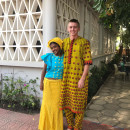
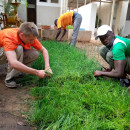
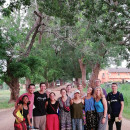
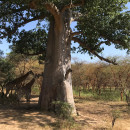
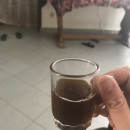
Personal Information
| How much international exposure did you have prior to this program? | 1 month - 6 months |
Review Your Program
|
* Overall educational experience
Academic rigor, intensity, resources, etc. |
The academics of the MSID Senegal program are intensive, meaning that for the portions that you are in class (i.e. the part of the semester that isn't the 6-week internship/research phase) you'll be engaged a lot with academic material. You generally have 3-6 hrs of class/day at the study center (WARC, West African Research Center) so I always thought it was the best use of time to spend my whole day away from home-- between classes you can do plenty of things to fill time like discuss/hang out with your MSID classmates, have attaya (the Senegalese sweet minty tea) or cafe touba or a snack, read for pleasure or homework, prepare homework/papers, find a spot to nap, call friends and family back home in the US, plan a short excursion out to a beach/into the city/to a market. The language used in all courses is French. Regarding the choice of language course that you have (either French or Wolof), I'd highly recommend Wolof (unless your French skills are pretty weak upon arrival in Senegal and French is the language you're seeking to improve in the most; that being said, learning/practicing Wolof as much as possible will help you to have an overall better and more-immersive experience so I'd recommend the Wolof course). For the Wolof language course you'll start at the very beginning with learning Wolof off of the basis of French, but Wolof classes pretty quickly evolve to continual building skills in Wolof only. Coming from an American educational-style background, the in-class experience can be tedious and hard to get through since all your profs are Senegalese and they have their own teaching styles/philosophies/idiosyncrasies that they themselves are very used to. Some professors will try their best to adapt their classroom management to how you as American students learn, but as that doesn't always happen and it isn't a fully realistic expectation, realize that you also have to put in an effort to adapt and put yourself out of your own comfort zone. If serious problems arise with teachers, though, talk to the MSID in-country staff and they will try to mediate on your benefit to resolve the issue (they are very interculturally-competent so they understand the American struggles and viewpoint, but they also know how to communicate that to a Senegalese). A lot of aspects of what you cover in classes may seem very theoretical and detail-oriented and thus it can be easy to lose focus, but try your best to stay engaged because a comprehension of the base concepts is ESSENTIAL to understanding the overall academic themes and MSID learning outcomes. Also things you learn and cover in class will help to explain many confusing/new phenomena that you observe about Senegal and Senegalese culture outside of class in daily life or with your host families, so it pays to pay attention! The homework load is doable as long as you know how to order priorities and have the will to plan time for homework as a priority. Generally you'll have some sort of research or reflection paper due every 10-14 days (these can usually be done in French or English), written exercises to complete 3-4 times/week for language classes (French or Wolof), and take-home/at-home readings 1-3 times/week for all other classes. Some of your courses will have Senegalese university students as TAs, and I highly recommend using them to gain insight into not only the course material but also to aid in cultural understanding/transition. Beyond the language training that you'll get in classes, I'd also recommend considering investing some of your free time at WARC with a trained, friendly Senegalese conversation partner in order to gain extra practice and more comfortability... just ask the MSID staff team and they'll be able to connect you. |
|
* Host Country Program Administration
On-site administration of your program |
They MSID Senegal program staff are seriously amazing human beings. They are kind, sweet, and understanding but also incredibly competent, knowledgeable, and professional in the roles that they serve. They are very personable/approachable, attentive, and easy to talk to; literally whatever question or issue you may have (which to be honest you WILL face as an American abroad in Senegal), they'll be able to answer and help you without making you feel guilty/stupid for asking or needing them. All MSID staff personnel are fluent in English Their individual daily schedules and pace of work may seem unpredictable and frenetic, so just be prepared (as with a lot of other things in Senegal) to practice patience and running on 'Senegalese time'! The Senegalese MSID staff do a great job of purposefully building-in times set aside solely for exploration and discussion of Senegalese culture and your transition/adjustment... they are super supportive in this regard too. During your first week in Senegal, they put together a great in-country orientation program as well. |
|
* Housing:
How satisfied were you with your living arrangements? |
Personally, my first month or so in Dakar was not what I had hoped/envisioned it would be like. I had come to Senegal with a misguided and ill-informed preconceived notion of what my host family experience would end up being like, and these expectations did not end up conforming to reality. Members in my host family first appeared rather cold, distant, and uninterested in me (but never disrespectful), like I was just a boarder (all MSID host families have a history of hosting Americans through various Dakar-based study programs, so it can seem like they are using you just for the housing stipend that you pay them through MSID program fees). But this kind of reception of American, relatively-wealthy guests into one's home I believe is also culturally-rooted in Senegal, so upon realizing that I became much more comfortable within the home setting knowing that I was indeed welcome and valued there despite the outward appearances/signals I was perceiving in my own American/Western mindset and viewpoint. But on the whole considering all MSID students in my group, I'd say absolutely terrible/offensive host family experiences were very few. Similar to me, everyone individually in their own contexts and settings trial-and-error mistakes-turned-learnings and little kinks they have to work out, but with time and experience you'll come to appreciate and move past those things since they inform you about how to best relate to and participate in your host family. Working out a good, decent relationship with your host family is also important because they serve as one of your primary guides to culture in Senegal; if you show willingness to adapt to them and an interest in participating in the ways of their family/culture, they will reciprocate and aid you. Households and families in Senegal are generally structured/organized in a sprawling, multigenerational fashion, meaning that in your host family there will likely be A) more people than you would originally expect, B) familial relationships that are hard for you to decipher and distinguish, and C) a number of people residing/present in the home that is in flux at any given moment. Home situations can thus appear to be chaotic from the American perspective where we have orderly nuclear family/household structures, but there really is always someone in charge serving as head of the family. Most MSID host families hire domestic help for cleaning, childcare, and cooking purposes; sometimes the housemaids live on premises and other times they come only during the daytime. Problems or tensions can arise with the maids, either between you and them or between them and the family, so if you ever observe/suspect something weird or awry bring it up to a MSID staff member (or better yet directly to someone you trust in your host family). Most MSID host families are Muslim, but in the typical Senegalese tradition they generally aren't too overbearing about their own religious practice (or critical of the religious practice/background--or lack thereof-- of their American student). They may be curious and inquisitive on this last point, however, so be prepared to be able to at least give some basic answers/explanations regarding your relationship to religion (forewarning though, they may be kind of weirded out by skepticism of religion or God). If you move outside of Dakar for your 6-week internship/research period, much of what is above can also be expected in more rural settings. One big difference is the in-family language: while Dakar host families use Wolof and sometimes French inside the home (they'll speak French with you), rural host families' use and knowledge of French is very little comparatively speaking. Depending on your rural location placement, there will also be 1-2 other local ethnic Senegalese languages present. While the language barrier is definitely real and you will experience challenges (but also growth opportunities) stemming from it, in your rural host family during those 6 weeks (if that's your choice) there will nonetheless be at least 1-2 people in your host family that have good proficiency in French. |
| * Food: |
The Senegalese diet doesn't contain a lot of variety (built upon staples of meat/seafood proteins and carbs such as rice, millet, and bread) but it is definitely flavorful and in my opinion a joy to discover. Host families generally don't have fruits around in the house for consumption (some might have it occasionally for dessert), but a good variety is easily attainable from markets, grocery stores, or roadside fruit stands. Local vegetables are featured in cooked cuisine so expect vegetables to come almost exclusively in a soft, cooked form (with the exception of salads); similar to fruits, raw vegetables are available for purchase on your own dime via the same vendors. Processed comfort/snack foods like cookies, crackers, candies are also cheap and available. If you ever get tired of Senegalese cuisine, Dakar has a lot of restaurant options for Western/French and other international cuisine. While it can be done, vegetarian diets can be hard to adapt to/accomodate in Senegalese food culture. Vegan and gluten-free diets are virtually impossible. |
|
* Social & Cultural Integration:
How integrated did you feel with the local culture? |
Personally, as I resolved the initial issues I had with adjusting to my host family, thereafter pace of my overall integration into Senegalese culture as a whole started to really improve. I also had the benefit of 7.5 months in Senegal (August pre-session+ academic year MSID program cut short 6 weeks by COVID), which is longer than any post-2020 students will be able to have since I believe MSID has cut the academic-year program. As a general rule, though, I feel mostly that the pace and depth of cultural integration increases as you 1) create friend/family networks and relationships, 2) move further along into the MSID academic curriculum, and 3) get the hang of Wolof and French. As attested some of my fall-semester program buddies, it's entirely possible to feel very at ease and in love with Senegalese culture & living by the end of just one semester abroad in-country. But just personally, for me reaching that point took longer. In the point of view of Senegal as a warm, tolerant, and accepting society, that is absolutely true. Teranga is real and you'll see and feel it! |
|
* Health Care:
How well were health issues addressed during the program? |
I can almost guarantee you'll experience some minor health mishaps (i.e. nausea/diahhrea) regarding adjusting to water and food quality abroad in Senegal. As bad as that may sound, that's the reality-- our American GI systems which are used to clean, crystal-clear water and stringent food safety standards are just not prepared for the impurities and quality issues regarding food & water that you'll come across in a developing country like Senegal. The good news is that you will adjust over time (the bad occurrences happen less and less after the first month passes), and learn/observe which food types to avoid that set off a bad reaction that gets you sick. The best thing you can do to prevent water-related sickness is to avoid drinking water that comes directly from a tap. The WARC center gets bottled water delivered that you use/fill up on, and nearly anywhere you can also buy individual bottles or big jugs for a cheap price. Or if you're like me and you detest single-use plastics, bring 1-2 waterbottles with built-in filtration technology along with you to Senegal (my preferred brand is LifeStraw) and you won't have to worry even if you do fill up your bottle with tap water! If these issues become serious (i.e. you've got nausea/diahhrea symptoms for more than 2 days from consuming food poisoning or bad water), let the MSID staff know. They'll bring you to a reputable, English-speaking doctor they contract with who will be able to prescribe medications and help you get back on your feet. Senegal is a hot, humid, and sunny place, so be sure to take precautions against dehydration, heat stress, and sunburn. Dakar doesn't really support a mosquito population that puts you at high risk for getting malaria (malaria is also strongly season-dependent based upon mosquito activity), but still just to fully protect yourself it is a good idea to take your malaria meds wherever you are located in Senegal. For any serious health concerns not resumed above, report them to the MSID staff team and they will be able to help you. While in Dakar, you'll have reliable access to expertise health care in a variety of practice areas that is comparable to US quality. Any vaccines you would need should be addressed/administered in the months before your arrival in Senegal via visits to your US travel doctor. |
| * Safety: |
The areas of Dakar that you will frequent most often are generally safe. Petty crime like theft on lone individuals can occur during daylight hours (with a higher risk at night), but it's reliably deter-able by using the buddy system and traveling in small groups when going out and about on foot. After arriving at home during nighttime hours, it's a good idea to re-confirm with everyone in the party you were with that they are safe at home. Some male Senegalese-to female American interactions in street settings can be uncomfortable and cause for alarm, but this is also often deter-able by traveling in parties of 2+ people (especially if at least one of the individuals is a guy). Wherever you go, always have on you a police-notorized copy of the visa page of your passport (the MSID staff will take care of obtaining the copy for you).... police occasionally 'frisk' foreigners and if you're caught without a form of ID proving you're legally in the country you'll cause a lot of headaches for yourself, the MSID team, and the US Embassy. When taking public/mass transit, make sure all your belongings and valuables are secured directly in your hands or inside the bag/backpack/purse you're carrying. You receive a good, detailed safety preparation talk during in-country orientation. |
| If you could do it all over again would you choose the same program? |
Yes
Personally, the MSID-Senegal program was just right for me. The MSID Senegal program structure and personnel team offered the right balance between supportiveness to students in processing everything new in Senegal, and encouraging independent/non-guided experiences for exploration. The academic focuses on international development and language practice/acquisition were exactly what I desired and I benefited greatly from participation in MSID. |
Finances
|
* Money: How easily were you able to live on a student's budget?
(1 = not very easy/$200+ on food & personal expenses/week, 2.5 = $100/week, 5 = very easily/minimal cost) |
|
| Not including program expenses, about how much money did you spend on food and other expenses each week? | $60-$70 |
| Do you have any general money-saving tips for future study abroad participants? | Learning and practicing as best you can the Senegalese art/practice of bargaining for your prices at markets and with taxi rides will make sure you get the best price possible! That being said, what you end up paying might well end up being more than what a Senegalese pays for the exact same purchase, since vendors and taximen upcharge you anyway knowing that you are a comparatively-rich foreigner. Consciously limit the amount of times you eat outside the home during meals that you already paid for via the program housing fee that goes to your host family (all meals on weekends, and breakfast & dinner M-F). Your family will appreciate the time that you spend with them during meals, and you limit spending out-of-pocket money on food (which due to Dakar's high cost of living is actually quite expensive compared to other areas in Senegal). Having a research/internship placement site outside of Dakar is a budget-friendly move. By moving to your site where you'll be the only student, and going to a locale with relatively little outside-of-home food options, you have no reason nor little incentive to have that expense. If you have a certain destination or certain plans in mind for what you'll do or where you'll go during your Fall/Spring Break, the earlier you can finalize those plans the cheaper you're expenses will be for transportation (if flying) and lodging reservations! The best general practice you can have is to make a budget taking into account the funds that you have available, and then prioritize what types of experiences you want to have while in Senegal so that you'll be able to allocate funds accordingly. |
Language
| * Did your program have a foreign language component? | Yes |
|
How much did the program encourage you to use the language?
0 = No encouragement, 5 = frequent encouragement to use the language |
As far as the MSID staff can enforce (during class time and during course activities), you will use French in those situations. Outside of class at WARC or while socializing/exploring with your MSID classmates, MSID staff didn't explicitly encourage speaking in French. But they also can't possibly enforce in those types of situations, so they give the free will of choice to you and your cohort. If you'd like to use French among/with your fellow American students, feel free! When you're interacting with non-MSID Senegalese, you speak in French (and/or Wolof if you're confident and a quick learner) out of necessity. |
| How would you rate your language skills at the beginning of the program? | Intermediate |
| How would you rate your language skills at the end of the program? | Advanced |
| What was the highest level language course you had completed prior to departure? | 36xx-level UMN French courses |
| How many hours per day did you use the language? | |
| Do you have any tips/advice on the best ways to practice the language for future study abroad participants? | Utilize the resources of Senegalese TAs and conversation partners, which are already part of what the MSID program offers to students. Talk with members in your host family, and ask them questions about culture, their life stories, topics in Senegalese news. Ask them to help teach/review vocab with you. Listen to Senegalese radio/music, watch nightly Senegalese soaps and TV dramas! Don't be afraid of mistakes, that's how you learn! |
Other Program Information
|
* Where did you live?
Select all that apply |
|
|
* Who did you live with?
Select all that apply |
|
|
* Who did you take classes with?
Select all that apply |
|
| About how many local friends did you make that you will likely keep in touch with? | 10+ |
A Look Back
| * What did you like most about the program? |
|
| * What could be improved? |
|
| * What do you know now that you wish you knew before going on this program? | Frankly, getting a head-start on Wolof lessons pre-departure is something I would've appreciated much and benefited from greatly. On another note, how important it is to try recognize, own, and defuse any preconceived ideas or notions that I had implicitly carried before actually beginning my experience abroad. |
Reasons For Studying Abroad
| To help future students find programs attended by like-minded individuals, please choose the profile that most closely represents you. |
The Academic or LinguistYou went abroad with specific academic goals in mind; the program credentials and rigor of your coursework abroad were very important to you. You had a great time abroad, but never lost sight of your studies and (if applicable) were diligent with your foreign language study. Good for you! |








